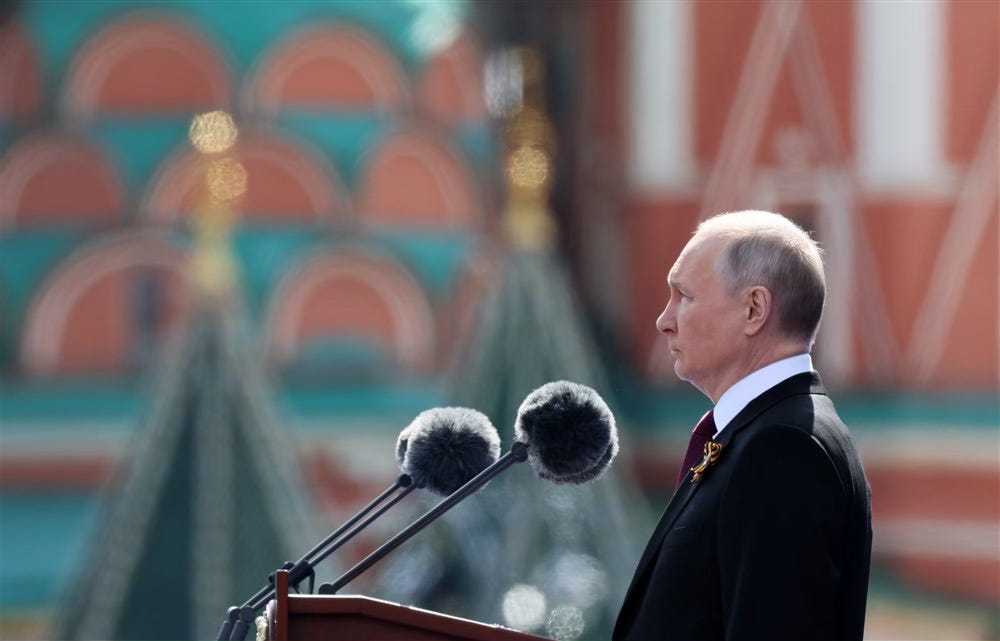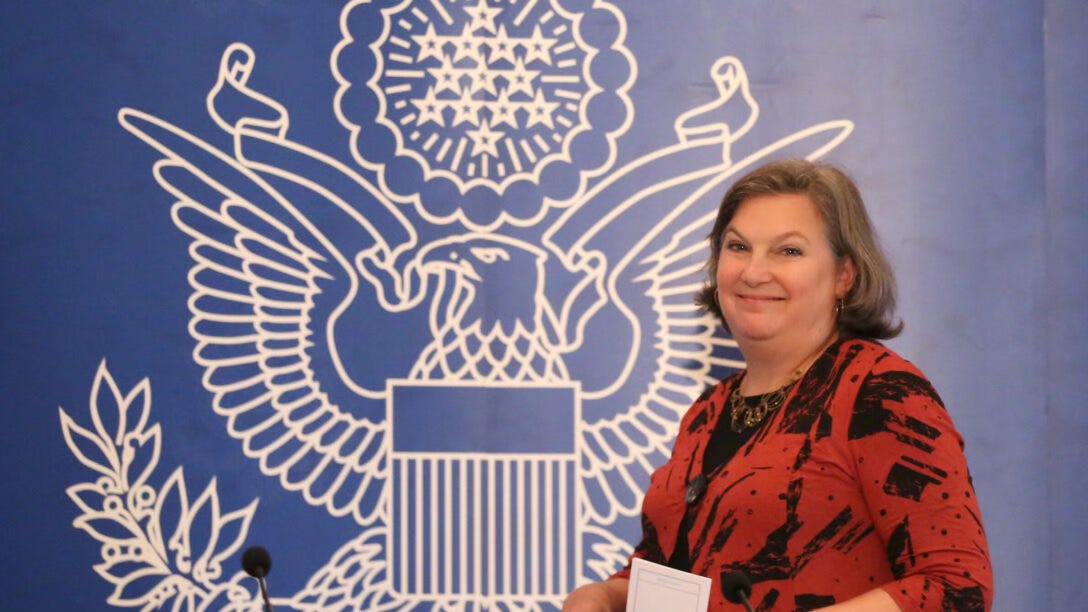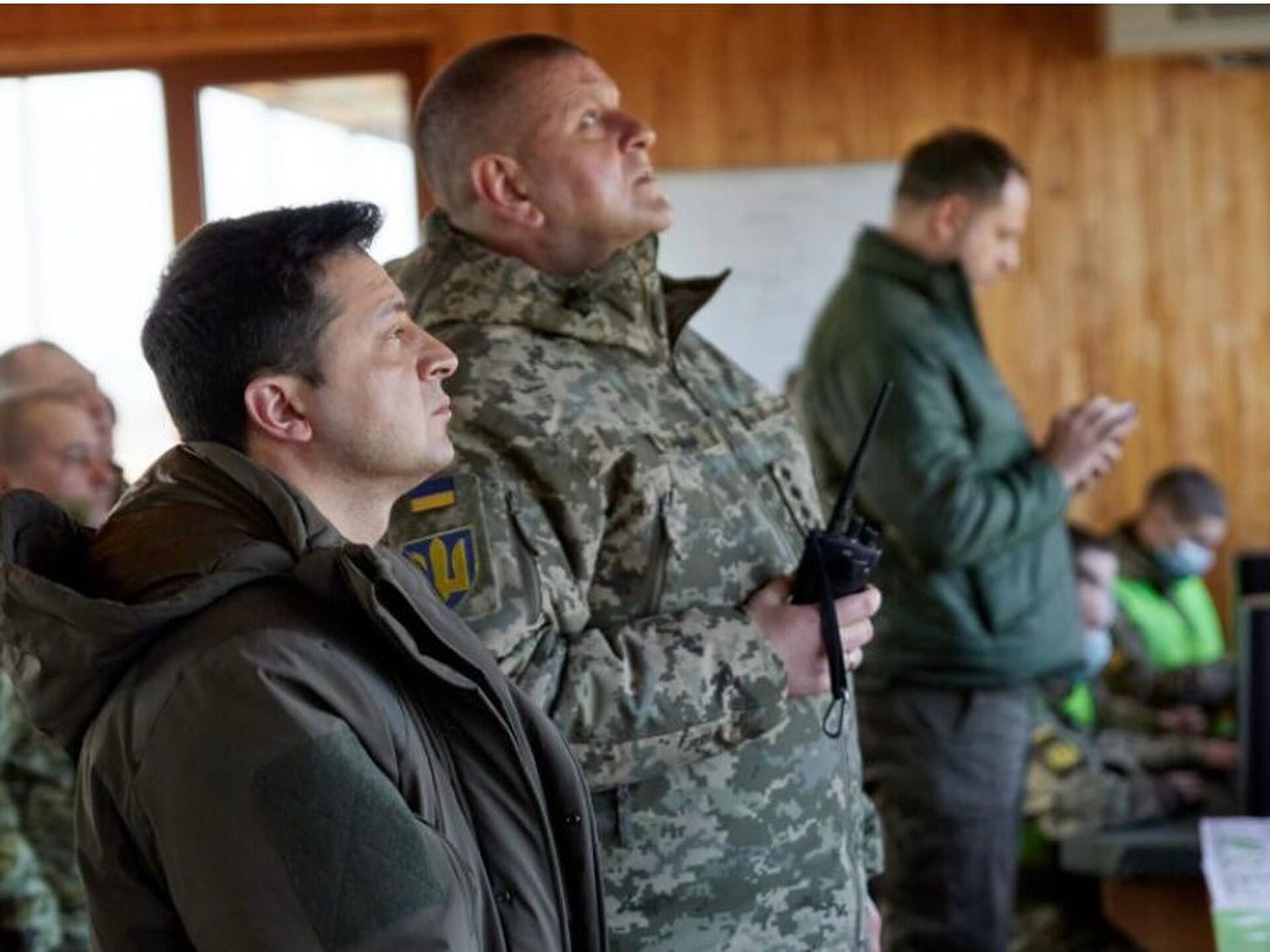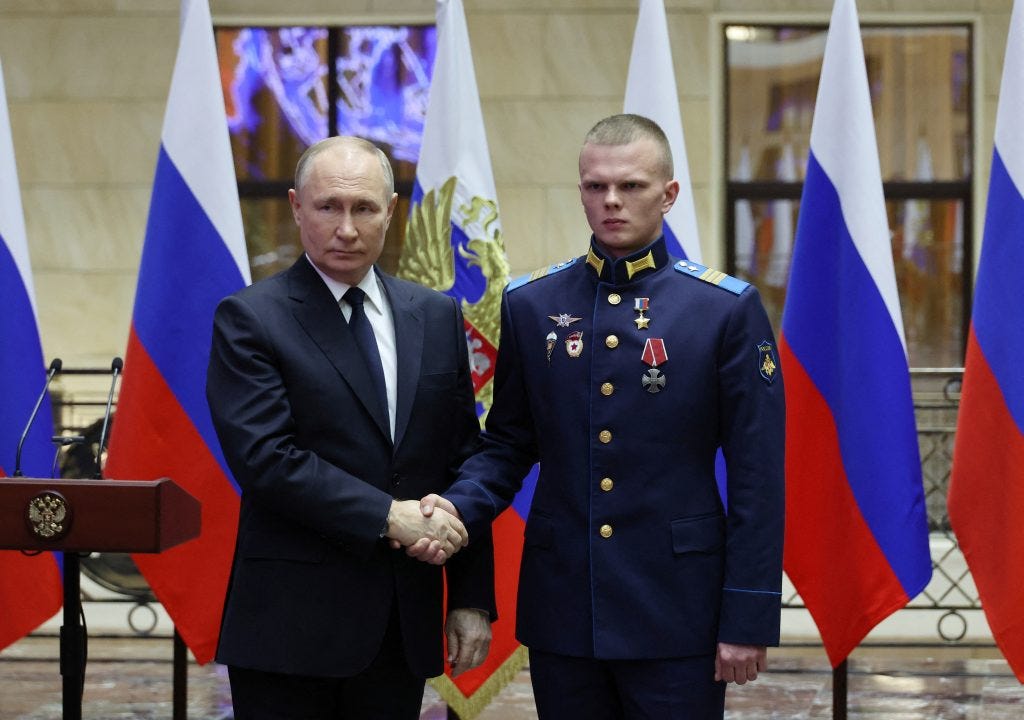Destiny and Interests
Vladimir Putin: There will be peace when we have achieved all our goals,” “Victory will be ours", Blinken nominates Kurt Campbell for deputy secretary of state over acting No. 2, Victoria Nuland.
UPDATE: Vladimir Putin “All responsible political forces must remember what is most important for us. That is, Russia’s destiny and interests, happiness, hopes, and the dreams of our children, the right of our country to be strong. I would also add, the right and vital need for our country to be strong.”
Anger and resentment is exploding in Foggy Bottom after Kurt Campbell, a close friend of Tony Blinken, was nominated for deputy secretary of state over the agency’s more experienced acting No. 2, Victoria Nuland.
In a new piece published Tuesday, The Economist stressed that relations between Zelensky and Zaluzhny have reached a boiling point.
When Vladimir Putin canceled his traditional end-of-year marathon press conference last winter, it was widely interpreted as proof that the Russian SMO was going badly wrong. This December the flagship event was back, and Putin made clear that he is in no mood to negotiate. “There will be peace when we have achieved all our goals,” he declared. “Victory will be ours.”
United Russia party congress
Vladimir Putin attended a meeting at the 21st congress of the United Russia political party.
Speech at the 21st congress of the United Russia political party
President of Russia Vladimir Putin: Friends, colleagues,
Mr Medvedev,
I would like to greet all the delegates and guests of the 21st congress of United Russia, our biggest and leading political party.
This degree of respect and public trust is based on United Russia’s clear-cut patriotic position, the results of many years of its work to meet people’s interests, strengthen the state, and develop the nation and all our regions.
First of all, I want to thank you for your consistent and unwavering support. It is important and matters a lot to me. Together, we have overcome hardships. Together we have achieved success, and we still have a lot more to do together in the interests of Russia.
Today, everyone bears an enormous responsibility. We have, without exaggeration, historic challenges facing us. Their magnitude requires joint efforts and cohesion of all patriotic forces.
For United Russia and our supporters, who represent our entire multi-ethnic society, all the regions, social and professional groups, this primarily means readiness for intense work, readiness to move forward and achieve more: To defend, together with the entire people of Russia, the country’s sovereignty, freedom and safety, everything that we hold dear – our history, culture, values, and traditions. It also involves strengthening the economy, the social sphere, the scientific and technological potential in the interests of people and for the well-being of millions of Russian families. And, of course, it means working towards consolidation of society.
Here is what I would like to stress: competition, diverse ideas and opinions, an open and honest discussion of problems and ways to solve them, is unquestionably a guarantee of the country’s dynamic development, no development is possible without all that. However, with all the differences in views, all responsible political forces must remember what is most important for us. That is, Russia’s destiny and interests, happiness, hopes, and the dreams of our children, the right of our country to be strong. I would also add, the right and vital need for our country to be strong.
This means that anything minor which disunited us must be discarded. And of course, we will take all our decisions only ourselves, without any prompts from abroad. Russia cannot, as some countries do, give up its sovereignty in exchange for sausage and become someone's satellite. We must remember and never forget and teach our children: Russia will either be a sovereign, self-sufficient power, or it will not exist at all. This is a very important matter which should always be on our minds and in our hearts. So, of course, we ourselves will determine and create our own future. This is a sovereign state worldview, the basis for true civic consolidation, for working together.
I am sure that United Russia will continue to offer society this kind of uniting and creative agenda and respond to the most urgent issues in the country’s life.
In this connection I must note that many laws to support special military operation participants and their families were drafted at the initiative of United Russia, while members of different parties in the State Duma voted in favour of them, in solidarity. Even though I am currently at the United Russia congress, I would like to thank them for that position, too.
By the way, the developments in the parliament are largely the result of the consolidating activity of United Russia at the State Duma. This was also mentioned at the meeting with the leaders of parliamentary party factions.
I ask you to continue the active partnership interaction with other political parties and public associations in resolving the most important issues for us.
I would like to underscore the following. The Western elites, as they unleashed a real aggression against us – it was increasing in intensity, year after year – expected to ruin not only the economy and the social sphere in Russia, but also our political and state system. They believed and still believe that they will be able to stir unrest inside the country. The methods of attaining this kind of destabilisation are well known and have been tested by the West in many parts of the world during the so-called colour revolutions.
But such recipes have not worked and, I am sure, will not work with regard to Russia – a free, independent, and sovereign state. Our society, all branches of government and levels of governance have shown maturity, strength, and stability.
We have responded to the challenges because we have been consistently going step by step and year after year along the path of strengthening our sovereignty, including in the political and public domains, in the economy, education and culture. We were promoting Russian federalism, our legislation and solid constitutional groundwork. We were drawing upon many centuries of our statehood, our values, and unique traditions of harmonious development of different ethnicities, cultures, languages, and religions.
In this regard, I will stress again that attempts to shake the inter-ethnic, inter-faith and civil accord are a betrayal and a crime against Russia.
It is Russia’s people who have been and always will be the only source of power. We will defend their sovereign right to choose their future from any outside interference. The Russian state will be sovereign, which means it will be a truly people’s state.
We have to further improve democratic institutions, mechanisms of people's power and local self-governance, direct participation of citizens in the development of the country, regions, and municipalities.
And the priority task is, of course, to improve the efficiency of public authorities at all levels. Meticulous work is to be done here including in legislation – in the federal and regional parliaments, and a widespread use of the best management practices and strengthening of human resources potential.
We are now pursuing a range of projects, initiatives, and contests for talented, skilful, and determined individuals to open up and fulfil themselves and do good for the country.
Such work with influencers and professionals who achieve success in various fields, with volunteers and certainly with our heroes – veterans of the special military operation, must become the most meaningful task for United Russia.
Many of our comrades – members of the party, its supporters, deputies of different legislature levels – have been on the front and are now fighting on the frontline. Let us support them. I want to note the following in this respect. You see, I regularly talk to our men, our fighters, our commanders, and they have told me many times that often there are people of different ethnicities and religions together in one platoon, in one squad, in one trench, but they are all united by a true brotherhood of war, determination to win, readiness to do everything to protect Russia, and we have only one Russia.
I know that United Russia is also actively involved in the development of the volunteer movement in close partnership with our other parties and public associations. Thousands of United Russia volunteers are helping the fighters, the front, and the civilian residents in our liberated towns and villages.
I repeat, we have many determined, courageous people who have gone to the front, who have shown themselves in the volunteer movement, in working in our liberated, historic lands of Donbass and Novorossiya, and we also have specialists from a variety of fields and professions who have shown in practice what it means to be loyal to duty and to one’s country during a period of hard trials. These include doctors, teachers, scientists and entrepreneurs, workers, engineers of defence and other industrial enterprises, farmers, and agricultural workers.
Such people are truly our treasure. They are the backbone of the country. They literally inspire those around them by their example and by their accomplishments. They create a sense of unity and confidence, pride in our contemporaries, pride in Russia.
I expect that during the elections at various levels, it is people like them, our like-minded people, who will become United Russia’s main candidates and will receive its support. And this will undoubtedly mean further qualitative progress and stronger ties with society for the party.
I remind you that the programme with which the party went to the parliamentary elections of 2021 was called the people's programme, so its implementation should be designed precisely for millions of people, for millions of citizens of the country. And as we agreed, this document should constantly develop, and this is actually happening, this document is filled with new ideas and projects – taking into account the issues already solved as well as the unresolved problems. In this way, the people’s programme has already reflected the key areas of socioeconomic revival of the Donetsk and Lugansk people's republics, the Zaporozhye and Kherson regions.
I expect United Russia to be most actively involved in the projects of the Year of the Family that has been declared in our country. I am confident that the party will put forward new initiatives, through dialogue with society and people, aimed at supporting motherhood and childhood, at strengthening our traditional family values and at developing the education and mentoring system. These are all extremely important, principled issues for the demographic development of Russia, for the preservation of our people.
You know what is happening on the ground, you yourselves work, as they say in such cases, on the ground, in the field, and you are well aware that there are still lots of tasks and unresolved problems. This is a well-known thing. As soon as you make a step forward, solve one problem, then two, three, four or five new ones emerge at once. And this is normal. There is no need to say: we have done this, but people are dissatisfied or want something else. It has always been like this and it will always be like this. We need to set ourselves up for the fact that tasks increase apace. We are Russia, we are a winter country, we love snow, look at the piles of snow that we have. I ask you to keep all this in mind.
Specifically in responding to people’s appeals, to their concerns, it is imperative to include in the pre-election programme such areas as the development of primary care, the construction and renovation of mass sports infrastructure, and so on.
I would like to emphasise that we will, of course, identify these and other tasks and plans for the future together. Together with the citizens of Russia, we will form a long-term development strategy. I repeat once again: we will do this, first and foremost, based on the opinions and demands of the people.
I would like to say once again: now every decision we make, every word we say and every deed we do has a special price, a special significance for our country. Time requires us to be firm and united, ready to respond to any, even the most difficult challenges.
I am confident that United Russia and all our supporters will continue to work with full dedication for results, for the people, for the achievement of national goals.
I look forward to further joint work with you in the interests of our united country and our great people. I thank you for your support.
Thank you very much.
Read more here.
Bad Blood at State
By Julia Ioffe
Anger and resentment is exploding in Foggy Bottom after Kurt Campbell, a close friend of Tony Blinken, was nominated for deputy secretary of state over the agency’s more experienced acting No. 2, Victoria Nuland.
Last Friday, the Senate Foreign Relations Committee held a hearing for the nomination of Kurt Campbell for deputy secretary of state. Campbell, who is an Asia hand, has been running the Asia desk on the N.S.C. until now. Campbell is the former C.E.O. and co-founder of the Asia Group, a political consultancy, and was Obama’s assistant secretary of state for East Asian and Pacific affairs, so his nomination makes sense for an administration that is still pursuing that elusive pivot to Asia. Still, Campbell’s nomination for the No. 2 job at State is not without rancor.
There is a lot of anger, both at Foggy Bottom and places adjacent to it, that the current acting No. 2, Victoria Nuland, was passed over for the job. Toria, as she is universally known in Washington, is, unlike Campbell, a career foreign service officer and commands a lot of loyalty in the building. “Toria shows a leadership that people appreciate,” said former assistant secretary of state and ambassador Daniel Fried. “She’s loyal down. She’s fun. She knows the building. She’s a foreign service officer who rose to those heights and still has a personality and an edge—and I say that as a compliment. She’s tough, but so what? Toughness is needed. Toria scares people. That’s a good thing.” Nuland, who is a Europeanist and democracy promoter, is also a bogeyman in Russia and despised by the Kremlin. It’s something Nuland wears as a badge of honor, and which makes people revere her even more. “There’s a reason the Russians can’t stand her,” Fried said. “She knows them and she doesn’t tolerate their bullshit.”
Then there’s the fact that she is being replaced by a man even though she has already been doing the job for six months. It’s not a great look, especially when there are already lots and lots of white men at the top of the State Department org chart. “We were hoping there would be some diversity in the top ranks,” said one Senate Foreign Relations Committee aide. As one State Department insider put it, “Toria is, on paper and in reality, so much more qualified for the job, and the fact that you’re replacing a woman with another white man who is perceived to be part of a very bro-y N.S.C. that has not always had a good relationship with the department, is sort of the cherry on top.”
Read more here.
In a new piece published Tuesday, The Economist stressed that relations between Zelensky and Zaluzhny have reached a boiling point.
The Economist has fired off another salvo in the behind-the-scenes war for control of Ukraine, citing polling showing a slide in President Zelensky’s rating against General Zaluzhny. But neither of the men will be able to do much unless they have Ukraine’s little-talked about “grey cardinals” on their side, says IR scholar Gilbert Doctorow.
The UK’s leading business magazine has followed up on its bombshell interview with an op-ed by Armed Forces Commander-in-Chief Valery Zaluzhny, in which Ukraine’s top general undercut his boss’ optimistic appraisal of the state of the conflict with Russia by admitting that the summer counteroffensive had hit a “stalemate,” and that there would be no “deep and beautiful breakthrough” against Russia, regardless of what “NATO textbooks” say.
Read more here (paywall).
Putin scents historic victory amid growing signs of Western weakness
By Peter Dickinson
When Vladimir Putin canceled his traditional end-of-year marathon press conference last winter, it was widely interpreted as proof that the Russian invasion of Ukraine was going badly wrong. This December the flagship event was back, and so was the swagger. Putin oozed confidence throughout his carefully choreographed question-and-answer session, which lasted for more than four hours. In addition to claiming large parts of Ukraine as “historically Russian territory” and insisting Ukrainians are actually Russians (“one people”), the Kremlin dictator also made clear that he is in no mood to negotiate. “There will be peace when we have achieved all our goals,” he declared. “Victory will be ours.”
As the New Year holiday season draws near, this same upbeat message of impending victory is on display in public spaces across Russia, and is becoming increasingly prominent throughout the country’s Kremlin-controlled media ecosystem. “It’s difficult to overstate the level of outward confidence currently being displayed on Russian state TV,” commented Russian media watcher Francis Scarr of BBC Monitoring on December 20.
The growing sense of triumphalism inside Russia is all the more striking as it is largely unconnected to any developments on the battlefields of Ukraine. Indeed, Putin’s invading army has barely advanced at all during 2023, and has spent much of the past year on the defensive. Nevertheless, there is no mistaking the change in mood among the Russian elite compared to the gloomy outlook of late 2022. This renewed faith in ultimate Russian victory owes much more to Western weakness than to the Kremlin’s own military might.
Since the early stages of this year’s summer campaigning season, international coverage of the war has focused almost exclusively on Ukraine’s failing counteroffensive. This has obscured the fact that Russia’s own attempted offensives have proven equally underwhelming. Despite mobilizing more than 300,000 additional troops in late 2022, Moscow has been unable to achieve any major military breakthroughs over the past twelve months. Instead, the front lines of the war have remained largely static, with Russian commanders paying a terrible price in men and equipment for comparatively modest gains that have often been measured in meters rather than kilometers.
The absence of international media interest in Russia’s lack of progress speaks volumes about the country’s diminished status as a military superpower. On the eve of the full-scale invasion, many experts believed Ukraine would be no match for Putin’s army and predicted the country would fall in a matter of days. Less than two years later, Russia’s multiple failed offensives and catastrophic losses are now increasingly taken for granted. Rarely in modern history has a country’s military reputation taken so severe a battering in such a short space of time.
While the Russian army has little to cheer, the situation at sea is arguably even worse. The Russian Black Sea Fleet’s shortcomings first became apparent in the early months of the war with the sinking of fleet flagship The Moskva and the retreat from Snake Island. However, these setbacks were to prove relatively minor compared to the fleet’s dramatically deteriorating fortunes during 2023. Despite not having a navy of its own, Ukraine has used a combination of drones, missiles, and commando raids over the past year to break the blockade of the country’s Black Sea ports and force Russia to withdraw the bulk of its warships from occupied Crimea. The most humiliating blow in this innovative Ukrainian campaign came in September, when the headquarters of the Russian Black Sea Fleet in Sevastopol was partially destroyed by a Ukrainian airstrike.
With 2023 offering very little in terms of genuine Russian military success stories, why is the Kremlin suddenly so bullish about the future prospects of the invasion? This optimism is in large part due to a weakening of Western resolve that has become increasingly evident during the second half of the year. The failure of Ukraine’s counteroffensive has played a key role in this process, leading to widespread war weariness and increased talk of “Ukraine fatigue.” With no end in sight to the conflict, a major new American support package has become hostage to domestic US politics, while EU leaders were recently unable to secure unanimous support for a landmark multi-year aid initiative.
Western weakness is playing directly into Putin’s hands. Ever since the failure of its initial blitzkrieg attack in spring 2022, Russia’s strategy has been to outlast the West while gradually overwhelming Ukraine. Putin is openly preparing his country for an extended confrontation with the Western world, and has shifted the Russian economy to a war footing. This long-term approach appears to be working. Many in Russia are now convinced the West is preparing to abandon Ukraine and are openly relishing the prospect of what would be an historic victory.
As the world prepares to enter 2024, the stakes in Ukraine could hardly be higher. If Western indecision and disunity allows Putin to achieve his goal of extinguishing Ukrainian statehood, the implications for international security would be disastrous. A resurgent Russia would almost certainly go further, either by targeting low-hanging fruit such as Moldova and Kazakhstan, or by testing NATO itself. Even in a best case scenario, the countries of the democratic world would soon find themselves forced to drastically increase defense budgets to levels that would dwarf the current cost of arming Ukraine. Meanwhile, other authoritarian regimes would seek to replicate Russia’s success. The whole world would be plunged into a new era of instability.
If Western leaders wish to prevent the collapse of the international security system, they must recognize the necessity of defeating Putin and finally give Ukraine the tools it needs to secure victory. There is nothing inevitable about the current stalemate; on the contrary, it is a direct result of the failure to arm Ukraine adequately in 2023. With sufficient weapons, Ukraine has already shown it is capable of beating Russia on the battlefield. However, without continued Western support, Ukrainian resistance will likely end in tragedy.
Fateful months lie ahead. The collective West has more than enough economic, industrial, and military resources at its disposal to surpass anything Russia could hope to muster, but Western leaders have yet to demonstrate the necessary political will to win. Unless this is urgently rectified, 2024 may go down in history as a decisive year not only for Ukraine but for the entire Western world.
Read more here.








